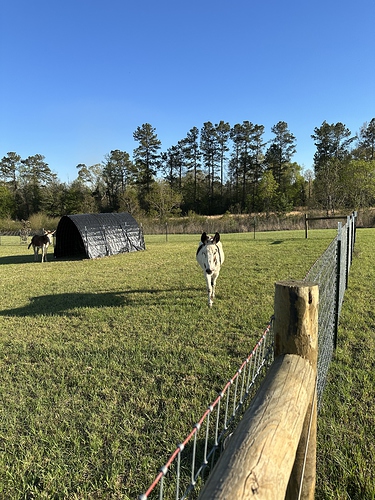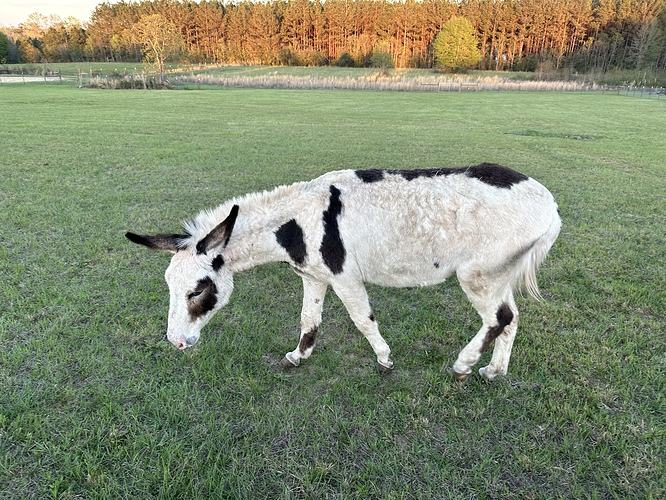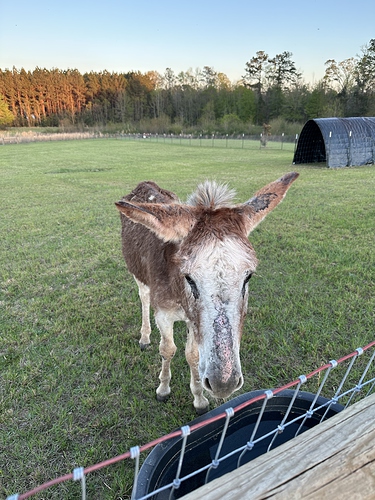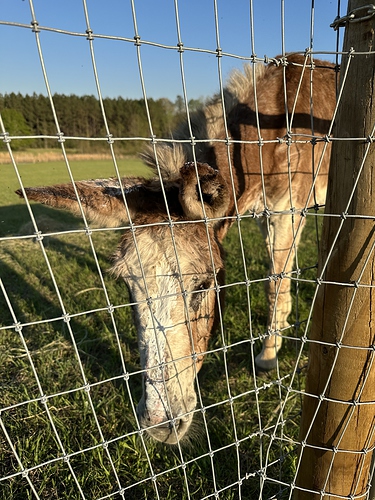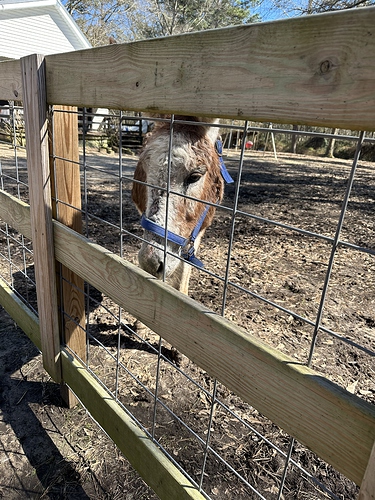I just put a deposit on two standard donkeys, and it will likely be a week or two before they are delivered to my house, but I was wondering is grass hay really all they need? I plan on offering them free choice hay and loose minerals but should I give them a small amount of ration balancer or will the hay be complete enough for them?
Depends on how “nice” the hay is. You can only tell that with hay testing. Donkeys do not need alfalfa, or mixes with it in the hay. Feeding ration balancer without knowing what vitamins and minerals hay contains, could lead to over-supplementing the donkeys, skewing things.
Our grass mix hay needs very little in supplements, but is high in sugar, also not great to feed donkeys. They need to be kept on the lean side, skinny necked, to prevent laminitus. Easy keepers, like ponies. Perhaps timed turnout on any kind of semi-nice pasture. Seeing a fat neck right under his mane is your warning sign! Muzzle him, lock him in a dry lot, but get the weight back off him BEFORE he founders.
Donkeys were made to survive and work in rough conditions, having to walk distances between mouthfuls of “greenery” available in that area. And they managed well on this less than perfect diet, plus putting in a full days work driving, ridden or hauling loads for their owners.
I would get their teeth looked at, many donkeys never see a dentist. Line up a Farrier who works on donkeys, not all will. If they are not trained to foot handling, BE CAREFUL! Wear a helmet always!! They can kick from nose to tail before you can blink!! Tranquilizing them is helpful in protecting the humans during hoof work. Make sure they are REALLY tranq’d to stand, before Farrier starts. Sometimes you can see them cursing you with their eyes as a sign!! A good sign they have enough meds. Ha ha Still keep your helmets on, save your heads.
Congratulations on getting them. They will gain trust in you with time, gentle handling, though they may always need to be tranq’d for teeth and hoof work. They truly do not forget being frightened, but they WILL try for you when they understand what you ask. Has to be very clear so they go forward.
Vet check is definitely one of the first things on my list, including teeth, and they do have a farrier that is in the same area as me, but the place I ride also might have suggestions since they also have donkeys. These guys are rescues, and to be honest I think they were slightly overwhelmed with donkeys but the ones I picked seemed to be more in your pocket types and low on the totem pole so I think they’ll appreciate more individual attention.
So it sounds like grass hay, minerals and water and maybe a grazing muzzle when the grass starts up again will work.
I’m excited for a couple of new fuzzy faces 
@ziggywiggy Sounds like a plan. Hope they continue to like being with you.
The neck is your clue about being too well fed. It needs to be pointy, like their mane. The least bit of neck width, not being pointy, means they are too well fed. Oddly, they may actually be a bit ribby with the fat neck. Still is best to cut back on the calories. All of the Ass family are kind of slab-sided, so ribs showing is not actually a sign they are “thin” like seen in the horse family.
You PROBABLY should muzzle or time their grazing BEFORE the fields show green. Just being safe, it really doesn’t take a lot of grass to get them in trouble. They might find lots of sprouts under the dead leaves! You don’t want to be surprised with a colic.
Donkeys don’t need a lot of vitamins and minerals as compared to horses, but I find mine do better overall with a little bit of supplementation. I current give mine a small handful of ration balancer to be included at mealtime. I’ve also used a vit/min supplement carried in hay pellets in the past, but it’s actually cheaper to use the RB. I would not give them anywhere near the recommended amount of ration balancer for their weight- donkeys don’t need that protein.
The Donkey Sanctuary is an excellent source of donkey nutrition.
and pleeeeeeeze post pics when you can!
I’ll 2nd the pics!
One of my good friends keeps overflow rescue donkeys. She feeds 50/50 straw and grass hay. They live on practically nothing and seem to thrive.
I bed with straw and feed hay lightly.
I agree that you may need to use grazing muzzles if your pasture is lush. If you don’t have experience with using muzzles, there are a few points to consider. Among them, the animals can’t eat at all if the grass is too short or two long. So when the grass is super rich and short in the early spring, a muzzle will prevent them from being able to eat at all - you may need a dry lot for that time. I’ve been muzzling one horse for 15 years and she does not seem to get enough hay through a muzzle, so she’s in a dry lot during the spring.
@luvmyhackney As a point of interest, what kind of straw does your friend feed the donkeys? I have a variety of straw locally, would not want to advise the wrong type. I know they feed oat straw in winter cold, on the Canadian Great plains.
Locally midwest, straw is used for bedding, chopped to use seeding lawns, highway margins after new constuction, to help hold the seed until it takes root. That is mostly wheat straw.
I think it’s barley straw. I know it’s not oat hay as she says that it makes them fat.
I keep seeing using barley straw but all the straw I see for sale says not for ingesting. I wonder where they are getting straw from?
Donkeys are browsers; think eat like goats. Weeds, wildflowers, vines, etc. I provide mine wheat straw (in addition to a flake hay AM/PM) because that satisfies the browsing need and creates no dietary issues.
Create the very largest dry lot that you can which has horrible, if any, grass in it. Your donkey will love having room to roam.
My standard donkey gets a small serving of molasses free beet pulp (hydrated) twice daily to make up for no grass. The feed/vitamin supplements are appropriate in small portions.
Donkeys are prone to getting fly bites on their legs which can turn into open sores over night and create a cascade of issues. This will be less of an issue if your donkey is unclipped. Bottom line, use a quality fly spray. I use fly boots too.
Your donkeys are going to whine and pine to be out on lush pasture. Employ tough love and ignore those request.  After the spring grass growth has subsided they can have 2 or 3 hours a week, tops, and do the turn out first thing in the morning. Afternoon grass has much more sugar in it and sugar is the enemy of your genetic desert animal.
After the spring grass growth has subsided they can have 2 or 3 hours a week, tops, and do the turn out first thing in the morning. Afternoon grass has much more sugar in it and sugar is the enemy of your genetic desert animal.
You are going to love having donkeys around!! They are spiritual animals. Just keep in mind that they do not think or react like horses do and you’ll succeed!
These people make custom fly boots, since donkeys are frequently between sizes:
The donkeys are here! I’m excited but there is a caveat that the older gent looks awful. He was already skinny (he ate something he shouldn’t have and was down for a week at some point) but I had no idea how absolutely god awful the flies would be here. He quite literally was getting eaten up, but he did allow me to spray him down with fly spray and paste up some of his older ouchie spots that the flies are absolutely attacking. I noticed an immediate difference in his discomfort after the fly spray. I don’t know if there is much else I can do except reapplying the spray and paste.
Those are pre-paste and post paste pictures but I swear I think they’ve just been tearing into him. I’ve been watching to make sure he’s been going to get water. The minerals have the garlic salt in them which supposedly helps. I’m happy with them both but I am worried about the old guy.
I had the farrier trim them before they came so they are good on that end.
@ziggywiggy They need muzzles right now!! Pasture grass may look sparse to you, but it is pretty lush for donkeys! Please do not leave them out eating on it all day because they really are not used to that kind of food. Too much and too rich for them.
They can get enough grazing while wearing a muzzle! Avoid laminitus.
Nice to hear they will accept being fly sprayed and medicated on sores. That will help with the insects. Perhaps in a few days you can bathe them. I suggest tying them and using warm water which gets dirt off better and they should be more accepting without water being chilled. Take your time easing into the bath. They won’t smell as attractive to the bugs when clean. They might actually like being scrubbed on, donkeys tend to be quite itchy, like coarse brushes for body grooming. They have nice faces, will be very cute to have around as they settle in!
Muzzles are definitely coming, I haven’t been able to work too directly with them, just what I’ve been able to do with them coming up to me in the pasture so seeing how amenable they are to being tied or muzzled is probably a week off. Long term plan is to get some corral panels to section off the part of the pasture with the shelter and turn that into a dry lot, then I can just open to let them out as needed. I did mow everything down as low as possible before they arrived, it went from dead stuff to bright green over night. 
Wooo boy, that one has some serious skin issues going on. Hope you can bathe him with a medicated shampoo a couple times a week until it calms down.
For what it’s worth, I use this product my vet recommended during the summer months to keep my donkey’s skin happy. The cost is reasonable after spending 2K a couple years back when one fly bite turned into a systemic issue.
Ditto Goodhors about getting them off that grass or muzzled ASAP. Use hot wire to make a small pen until you can get the corral panels.
Best of luck going forward!

